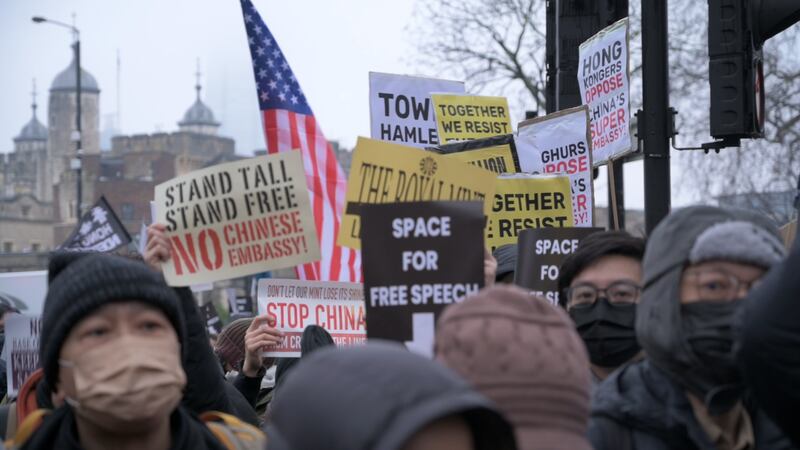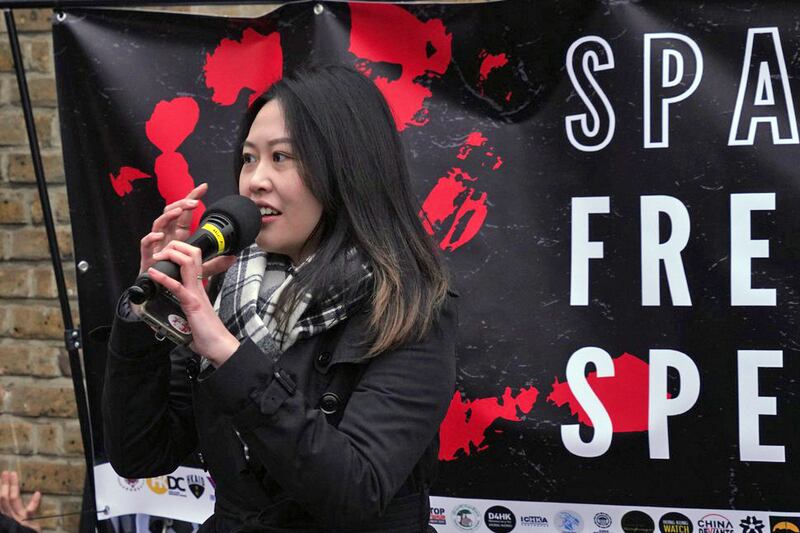Hong Kong police have taken away and questioned two family members of exiled Hong Kong democracy activist Carmen Lau in a move she said was likely timed to follow a protest in London against China’s planned new “mega-embassy” over the weekend.
National security police took away Lau’s aunt and uncle from an apartment in the New Territories district of Tai Wai on Monday morning, the South China Morning Post newspaper reported.
Lau, a former pro-democracy district councilor who now works in a senior advocacy role at the overseas-based Hong Kong Democracy Council, confirmed the story via her X account, adding: “The national security apparatus has now extended its reach to my extended family.”
“The timing and intent behind this move are quite obvious—coming after our meeting with the Foreign Secretary and the protest against the Chinese Super-Embassy,” Lau wrote. “This is nothing more than an attempt to intimidate Hong Kongers, both in Hong Kong and overseas.”

Thousands of protesters representing Tibetan, Uyghur, Chinese and Hong Kong rights groups rallied on Saturday in London against plans to convert a historic building into extra-large Chinese Embassy, voicing fears that Beijing would use the building to harass and monitor dissidents living abroad.
Organizers said around 4,000 people joined the protest at the proposed site of the embassy at the historic former Royal Mint Court, near the Tower of London. Police did not respond to requests for a crowd size estimate.
Bounty on her head
Lau, who has a HK$1 million (US$128,000) bounty on her head and stands accused of “incitement to secession” by National Security Police, said the questioning of her relatives would have “no deterrent effect” on her advocacy.
Lau added: “Sorry for any trouble this may have caused to my family. Since we have long lost contact, I can only take this opportunity to wish everyone well.”

Hong Kong’s leader have vowed to pursue activists in exile for life.
Meanwhile, British police arrested two Hong Kongers -- a man and a woman -- on public order charges at Saturday’s protest in London, the Metropolitan Police told RFA Mandarin and Cantonese.
RELATED STORIES
Hong Kong offers bounties for 6 more democracy activists
INTERVIEW: Hong Kong pro-democracy councilor finds renewed purpose in exile
Thousands rally against China’s ‘mega-embassy’ in London
Both have been released, but there are plans to prosecute the man, although charges have yet to be made public.
The woman, who gave only the nickname Wing for fear of reprisals, said she was held for 12 hours and “rudely treated” by officers.
She said she was arrested under Section 14 of the Public Order Act after police told her to stand in a cordoned-off area, and unceremoniously dumped into a police vehicle.
A male officer refused to leave the room while she was body-searched, Wing told RFA in an interview at the weekend.
She was held alone in a cell for more than eight hours, before being released at 3.00 a.m. on Sunday, she said.
Fleeing Hong Kong
According to Wing, police were far tougher on Saturday’s demonstration than on previous protests, and manhandled them without explanation.
The Chinese government purchased the historic Royal Mint building in 2018 with plans to build what would become Beijing’s largest diplomatic facility globally. Plans show that it is expected to be 10 times the size of a regular embassy and house cultural exchange centers and 225 apartment units.
Previously, the Metropolitan Police had objected to Beijing’s plans to redevelop the former Royal Mint Court site into the Chinese Embassy, citing a lack of space to safely accommodate protesters.
However, in January 2025, they withdrew their objection, citing a Beijing-sponsored report that claims the site surrounding the proposed embassy can safely fit up to 4,500 people.
More than 200,000 Hong Kongers have applied to the British government’s lifeboat British National Overseas visa scheme, which offers a route to permanent residency and eventual citizenship, since the scheme’s launch in January 2021.
The exodus from Hong Kong came after the authorities began a crackdown in the wake of the 2019 protest movement under two stringent 'national security' laws banning public criticism of the government or connections with overseas groups and democracy activists in exile.
Other popular destinations include Canada, Australia and the United States.
Translated by Luisetta Mudie. Edited by Malcolm Foster.
